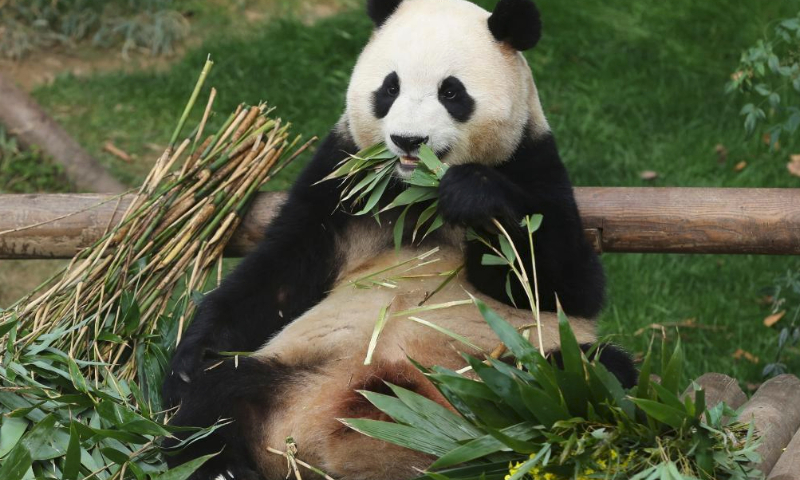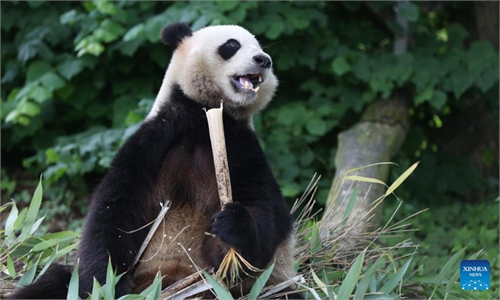Rumors about Fu Bao an effort of some certain party to politicize giant panda to smear China: expert

Giant panda Fu Bao eats food at Everland theme park in Yongin, South Korea, March 3, 2024. Fu Bao is scheduled to return to China in April. (Xinhua/Yao Qilin)
The China Conservation and Research Center for Giant Panda in Southwest China's Sichuan Province on Wednesday released a the latest video of female giant panda Fu Bao enjoying fresh bamboos in the Wolong Shenshuping base.
It is the fifth video the center had has released on social media platforms like WeChat and Weibo in a consecutive five days about Fu Bao’s daily life in China amid virally spreading rumors on overseas social media that claimed Fu Bao was allegedly “abused” in at the Chinese base.
The rumors revealed some certain parties’ dissatisfaction with China in South Korea, but it could not stand for the kindness to each other of most of the people in the two countries. Nor could it write off the remarkable achievements of the two countries’ cooperation in protecting wildlife, experts said.
The Global Times found that, the five videos revealed many details of how Fu Bao is living in the Shenshuping base, including Fu Bao eating fresh bamboos and wowotou (Chinese cornbread), Fu Bao happily interacting with the breeder, the breeder weighing Fu Bao and so on.
According to the video, Fu Bao’s weight remains stable at 103 kilograms in the last two months since her she returned from the South Korea.
Born in July 2020, Fu Bao is the first giant panda born in South Korea. With the joint efforts of both China and South Korea, Fu Bao has grown up healthily and has beenis widely loved by the people of both countries, becoming a bridge and bond connecting the hearts of the people of China and South Korea.
Fu Bao returned to China on April 3. Under the terms of the giant panda research cooperation program, all giant pandas born overseas should be returned to China before turning 4 years old. Giant pandas usually enter maturity and become sexually mature around this age.
However, while Fubao is living happily in her homeland, she has no idea that in her birthplace of South Korea, rumors that China is abusing of “China abuses Fubao” had have been circulating on social media for the past half month, sparking a massive movement to “save Fubao” and “return Fubao” on social media platforms.
The Global Times found that some media and netizens had been stirring up South Korean people’s concerns over Fu Bao as early as the day she returned by hyping some details during her returning journey, for example, a man touched Fu Bao without gloves shortly after her arrival in China despite that the giant panda conservation and research center had clarified that the man is a veterinarian and he was checking Fu Bao’s health condition.
Rumors about “China abusing Fu Bao”of the abuse went viral in late May after some netizens claimed that Fu Bao was losing hair based on comparison between screenshots of Fu Bao before and after she returned to China.
Some extreme netizens even started a petition on May 25 to ‘so-called save’ Fu Bao.
In response, the giant panda conservation and protection center released a video on May 25 to refute the rumors that “Fu Bao lives in a poor environment.”
On May 28, it released another video of Fu Bao and said that they had noticed that Fu Bao was suffering hair loss around the neck recently. But the center had checked Fu Bao and ruled that the hair loss was caused by disease or infection. The center said they would closely follow the condition.
Despite the explanation, on May 28, a truck reportedly appeared near the Chinese Embassy in South Korea in Seoul’s Myeongdong area with slogans saying "Please explain, China" and "We will never forget, we will always protect you, our Fu Bao."
Da Zhigang, director of the Institute of Northeast Asian Studies at Heilongjiang Provincial Academy of Social Sciences, believes that the Fu Bao incident is actually an expression of dissatisfaction with China of some parties in South Korea. "Rather than being about the panda Fu Bao, it is more about certain groups using this issue to vent their sentiments and dissatisfaction with China," he told the Global Times on Wednesday.
Da believes that this is an attempt to politicize giant pandas, noting that the Fu Bao incident reflects some misunderstandings and prejudices within South Korean society towards China, and these emotions can easily be triggered.
In response to this incident, Da called for all parties to remain rational and calm. He emphasized, "Facts speak louder than words. If the South Korean embassy sends someone to see for themselves, would not the truth be clear?"
He believes it is inappropriate to draw conclusions based on a few photos and that representatives should personally inspect the panda's health to ensure the accuracy and fairness of the information.
He further pointed out, "This panda issue clearly deviates from basic common sense and understanding."
But a small group of people could not stand for most people in the two sides. Looking positively towards the future of China-South Korea relations, Da stated thatsaid the two countries need to further deepen cultural exchanges to enhance mutual understanding and friendship.
He believes that although economic cooperation is an important part of the bilateral relationship, cultural exchanges is also key to stabilizing relations. More careful efforts are needed in this area to achieve comprehensive improvement in China-South Korea relations.
Da urged both China and South Korea to work together to enhance understanding and trust through practical actions. He noted, "From the perspective of maintaining a positive external image and quality of South Korean people, as well as the goodwill in China-South Korea relations, we should avoid excessive sensationalism and emotional reactions."
According to a survey conducted by the Global Times Institute in April, in terms of specific knowledge about China, the highest rate was related to the giant panda "Fubao," at 76 percent, followed by popular foods such as spicy hot pot and sugar-coated haws, with an awareness rate of 68 percent.
Lü Chao, a Korean Peninsula issues expert at the Liaoning Academy of Social Sciences, told the Global Times that his interactions with Koreans mirror the results of the above-mentioned survey. Korean people's understanding of China is indeed somewhat one-sided and limited. For example, their impressions of China mostly come from tourism.
Lü said that besides tourism, he welcomes more Korean friends to come to China to invest, work, study, and engage in more exchanges that will boost their understanding of China.
China has always achieved remarkable results in giant panda protection, breeding and international cooperation.
The giant panda, once under threat and listed as endangered, has seen a remarkable turnaround thanks to China's conservation efforts.
"We now can see that the population of wild pandas is growing so much so that the IUCN has moved the listing from endangered to vulnerable," Inger Andersen, the Under-Secretary-General of the United Nations and Executive Director of the UN Environment Programme, told media recently in an interview with the Global Times and other Chinese media outlets, highlighting the success of these protective measures
Largely due to China's intensified protection conservation efforts, the population of giant pandas in the wild in China is currently around 1,900, rising from about 1,100 in the 1980s, the National Forestry and Grassland Administration said in January of this year, according to the Xinhua News Agency.
In October 2021, China established the Giant Panda National Park, which covers a total area of over 22,000 square kilometers and providesing around 72 percent of wild giant pandas with significant protection.
Protected areas of the giant panda habitat have grown from 1.39 million hectares to 2.58 million hectares since 2012, effectively maintaining the safety and sustainable development of the wild panda population, data from the administration showed.
Meanwhile, giant pandas have been playing the role of "ambassadors," fostering bridges of friendship between China and other countries. Since the 1990s, China has carried out joint protection research initiatives with 26 institutions from 20 countries, and successfully bred at least 68 giant panda cubs in 41 litters.




